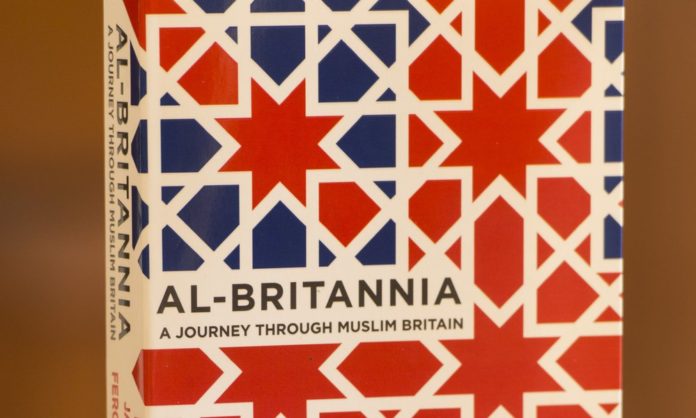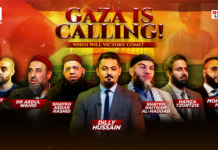5Pillars editor Roshan Muhammed Salih talks to the author James Fergusson about his important new book on British Muslims, Al-Britannia, My Country.
Fergusson spent a year traveling around Muslim Britain, from the major population centres of London, Manchester, Birmingham and Bradford to the Scottish Highlands.
In perhaps the best book ever written by a non-Muslim about Islam in Britain, Fergusson argues that Britain’s Muslims are remarkably misunderstood, both by the non-Muslim majority and by a government preoccupied with national security.
Al-Britannia, My Country makes the case for a reappraisal of “fundamental British values,” and argues for a new approach towards the practitioners of a religion that is part of all our futures now.
Roshan Muhammed Salih: Why did you write the book?
James Fergusson: My background led me into it. I’m a foreign correspondent by trade and I spent 20 years or so running around the Middle East and North Africa, Afghanistan and Somalia so I’ve spent a lot of time on stories involving “Muslim extremists” of one stripe or another but I only knew a little bit about the Muslim community here in my own country. Also, in 2014 the community here was in the eye of a storm because of ISIS and M16 said 800 kids had gone off to join them so I thought it was a timely moment to look at Muslims in Britain. And I could see the way the story was being reported wasn’t the truth quite frankly – you could just smell the hysteria in the media and from government. So I thought it would be a good idea to see it for myself.
RMS: You spent a year visiting Muslim Britain. What conclusions did you draw at the end of that process?
Subscribe to our newsletter and stay updated on the latest news and updates from around the Muslim world!
JF: Firstly, how overwhelmingly varied British Islam is, getting a handle on 3 million people is frankly impossible. But although there isn’t one unique Muslim community the sense of community locally wherever I went was very strong and Islam definitely binds everyone together.
Secondly, the very “Britishness” of British Muslims. There’s a narrative out there that British Muslims don’t feel British but I think it’s the opposite.
Thirdly, Muslims are every bit as mystified and scared and worried about extremism as everybody else is
And finally, I’d say there is a sense of fear, loathing and bewilderment at how the whole narrative has gone wrong. A lot of these segregated communities are being “monstered” as breeding grounds for extremism and are being called no-go zones, but when you actually go there (and I couldn’t find a no-go zone anywhere) they have a strong community spirit, respect for the rule of law and these are in fact characteristics that are incredibly close to traditional Tories.
RMS: You said that you found a community “burning with resentment” and that wasn’t being listened to by politicians and the media.
JF: Yes, that was certainly a strong strand of thought out there but equally there’s a strong strand of thought from people who just want to be left alone and want nothing to do with politics.
My starting point was to go out and interview all those who were constantly being named by media and government like CAGE and the Muslim Brotherhood and when I met them I just kept rubbing my eyes and thought: “Are these the guys that David Cameron labeled as extremists?” They are just not extremists and it’s important to portray these guys as human beings. I don’t necessarily agree with their political views but I absolutely defend their right to say them because we have freedom of political thought in this country and as long as you don’t break the law or incite that’s fine.
RMS: Do you think your own profession, the media, has failed to report on the Muslim community fairly?
JF: By and large yes. I’m a newspaper man and they are in the business of selling newspapers and ISIS was a cracking good story so the narrative got set very early – young kids being hoodwinked by wicked Islamists and then those stories were often accompanied by photographs of somebody in a niqab with a gun.
RMS: Do you think that parts of the media have an ideological agenda against Muslims?
JF: Some of them maybe, but generally I wouldn’t go that far. Questions are always being asked about the Murdoch press but I have friends who work there and I think people have an idea of what Murdoch thinks and then they might write that, but it’s not quite the same thing as having some sinister diktat hanging over you.
RMS: But it seems to me that the government is deliberately conflating social conservatism and political dissent with radicalisation, extremism and terrorism and the media is following that lead.
JF: Once government policy is framed in that way the media do follow. They are in a sort of alliance even though that sounds a bit conspiratorial. I do blame the media for what has gone wrong but I think the government has more responsibility for it.
RMS: Could Muslims do more to root out extremism and terrorism?
JF: I’ve been hearing that argument for 20 years and I think it’s nuts. When someone decides to blow themselves up they don’t tend to go and tell their neighbours and friends about it so what are Muslims supposed to do?
They are on the lookout for it; there are some extremely impressive counter-radicalisation Muslim grassroots organisations out there and they are doing their best. Under Cameron and Theresa May at the Home Office they’ve gone after the ideology; it’s wrong that the ideology is being twisted but that’s not the only reason why people become extremists. The country’s own intelligence services know this, there is no one single path towards terrorism. You need a far more nuanced approach to this stuff.
RMS: As a non-Muslim what do you make of some of the social conservatism that exists in our community that may be at odds with Western values? For example, most Muslims will think that homosexuality is a sin.
JF: I think the centre ground of British Islam is much more conservative than the government believes because they tend to only listen to reformers and liberals. That said, I think morality is a private matter and the state shouldn’t be legislating for morality as long as you obey the law.
I was born in the 1960s when homosexuality was still illegal but public values have changed although traditional Islamic ones have not because they are taken from the Quran. Who’s to say who’s right? It is possible to have private views about homosexuality and obey the law. We live in a very diverse society and you have to make allowances for people’s private beliefs and prejudices.
RMS: You’ve probably visited Muslim Britain to a greater extent than any of us. What was your favourite and least favourite place?
JF: I found some places just jaw-dropping. Bradford is an extraordinary place physically – the hills, the terraces going around and the factory chimneys, the grimy Coronation Sreet feel to it; it’s incredibly Asian and I had no idea it was like that. East Birmingham was another one, the size of it just goes on and on.
I thought the sweetest and the most moving community I saw was probably in Inverness. I was there on the summer solstice during Ramadan and the imam told me that there were about 500 Muslims in the Highlands and they come into that mosque as it’s the only one in that area. And what’s so amazing is that because it’s the only mosque sectarian differences get forgotten so you’ve got Shias and Sunnis all praying together.
The feistiest place where I thought I was going to have trouble was Luton but I didn’t in the end. Luton has been under the microscope for so long and people are fed up of the attention so it has more of a shell around it than most places, but even there once I explained what I was doing and with the right introductions it opened up very nicely.
RMS: You fasted the whole month of Ramadan last year. How was that?
JF: I thought it was very tough but I really enjoyed it in the end. My family thought it was hilarious. My 8 year old daughter would say to me: “Daddy, if you cheat and eat something does God kill you?” It was very educational for them too. Fasting forces you to reassess the way you live. Westerners tend to live with very little discipline in our lives and if we want something we just go out and buy it and so I ended up thinking about consumerism in quite an existential way. It makes you think how lucky you are to be able to indulge all those desires that you have. If more of us fasted I think the world would be a better place.
RMS: You write about Scotland in a very positive way and as a model of how Muslims can be well integrated into British society.
JF: Muslims up in Glasgow will happily call themselves “Scottish Muslims” or “Scottish Asians” in a way that English Asians wouldn’t. A lot of Scottish Muslims have bought into the independence campaign and the SNP. There is an inclusiveness up in Scotland that we need to do elsewhere. The way the authorities have handled terrorism is also different to England; they’ve rushed to mosques and given people a hug and said “we stand with you.” And their attitude to foreign policy and the Iraq war is also different. That’s important.
RMS: After all the time you spent with Muslims were you tempted to convert to Islam?
JF: No, there is much that I like and admire about Islam and I think a life without spirituality is a less rich life but in the end I think I’m just too much of a Westerner and I’m too jealous of my own independence. And there’s an aspect of Islam that I find a bit constraining and it is very didactic. It’s a holistic system for the whole of life and you can’t be a Muslim-lite. You either buy into it or you don’t.
RMS: Finally, are you optimistic about the future of Muslims in Britain?
JF: We are all part of one nation here and Britain is getting more crowded. And as it does I think our responsibility towards each other increases; there is a moral obligation to find ways of living better together.
But I am optimistic; the things that people complain about – FMG, misogyny and honour killings – are not Islamic at all, they are cultural. As time goes by these things will fade. The government is trying to crack the whip and tell Muslims to assimilate but actually they are doing it by themselves. I think a distinctive form of British Islam is emerging. Society is incredibly multicultural and that’s not going to change. Let’s celebrate it.
Al-Britannia, My Country is available to buy on Amazon from this link.


















